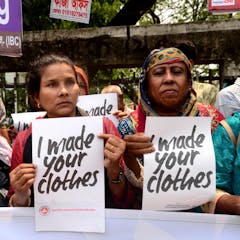
Articles on Consumers
Displaying 21 - 40 of 227 articles

Returns cost companies billions of dollars in lost sales. They also generate emissions and packaging waste. Two logistics experts offer some tips from psychology for more sustainable returns.

Companies tend to focus on appeasing angry customers after a data breach. New research shows they may want to pay more attention to customers who are afraid to return to their site.

Audiences love improvised, off-the-cuff entertainment, and new research suggests it’s because spontaneity seems to offer a glimpse of the performer’s authentic self.

New research on our desire to create shared memories with the people we care about offers insights for companies that want to improve their customer service.

Two experts on children’s play explain why you should be skeptical of toys that are advertised as being educational, and what to look for instead.

Retail stores change the prices of their products based on the shopping habits of consumers. But consumers come in a variety of types, and not all of them influence prices equally.

Scrolling TikTok or Instagram causes mental fatigue, which can lead people to purchase items based on how many ‘likes’ an ad has instead of how much value the product will bring them.

Ten years after the collapse at Rana Plaza in Bangladesh, the garment industry’s deadliest disaster, reforms are incomplete. The opaqueness of today’s complex supply chain is part of the problem.

The perspective that U.S. retailers are somehow more prone to failure than Canadian retail chains is unconvincing, but the Canadian retail landscape is challenging for newcomers.

Many Starbucks customers are irked by recent changes to its popular rewards program. But they may not have as much to complain about as it seems.

Reducing food waste at home is an action that anyone can take to help slow climate change, often saving money in the process. More consumer education could help show people what to do.

Supply chain difficulties and rising costs have forced Made.com into administration

Businesses can now pass credit card surcharge fees along to their customers. To help businesses predict how consumers will react to credit card surcharges, behavioural economics offers some answers.

Most households pay a flat rate 24/7 for electricity although the cost of generating it fluctuates through the day. Wireless technologies are changing that system.

When we look at certain prices, we jump to conclusions about inflation rates that are not accurate.

How to spot the changes made to goods and services as a result of rising costs.

Emerging platforms are challenging traditional tech giants by giving consumers and workers more power

Professor Leigh Sparks looks at the latest UK retail sales and consumer sentiment data.

What you need to know about blue light protection lotions.

The rich history of UK consumer culture has been captured in the composition of the ‘basket of goods’ used to measure inflation.
